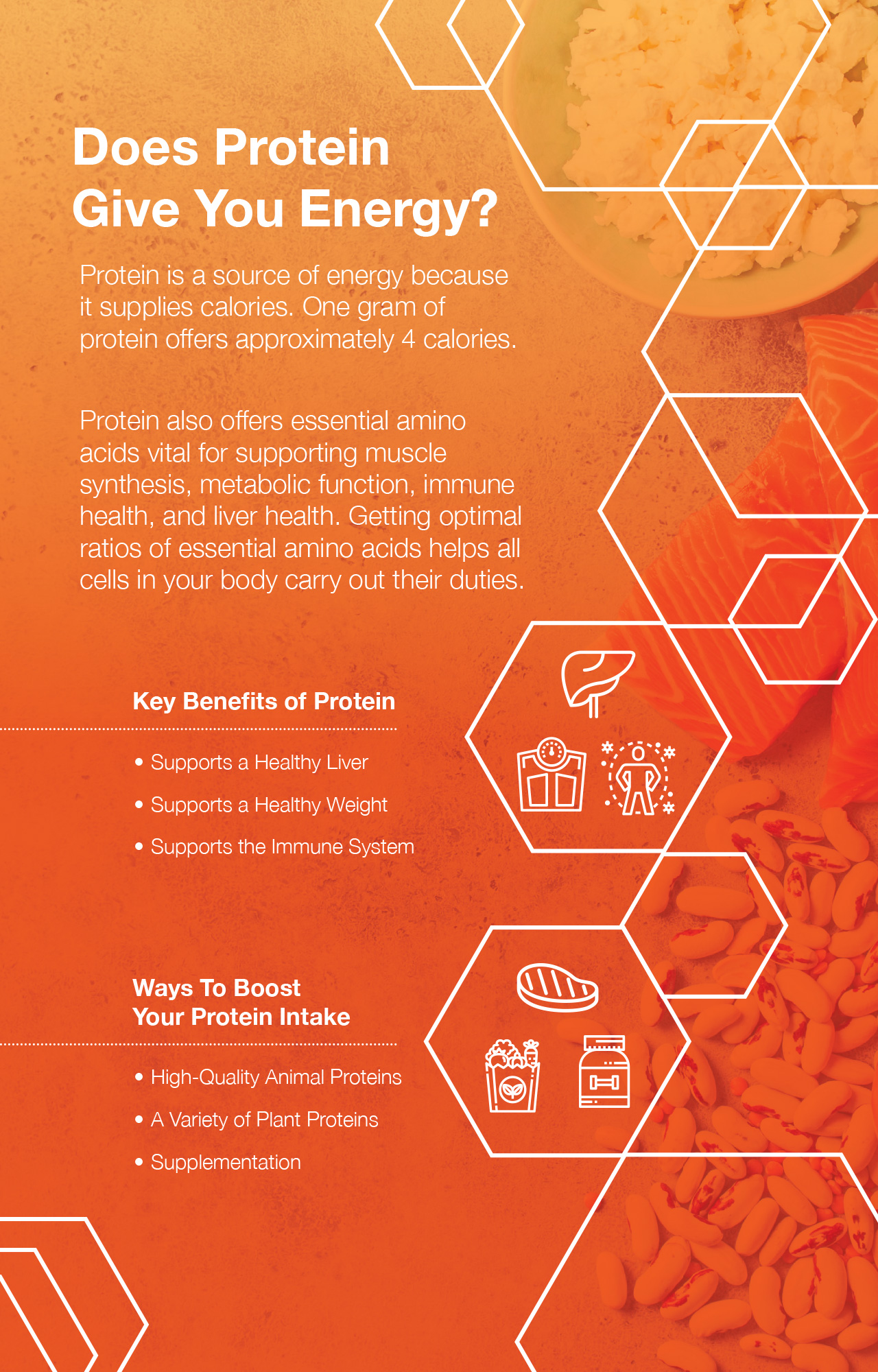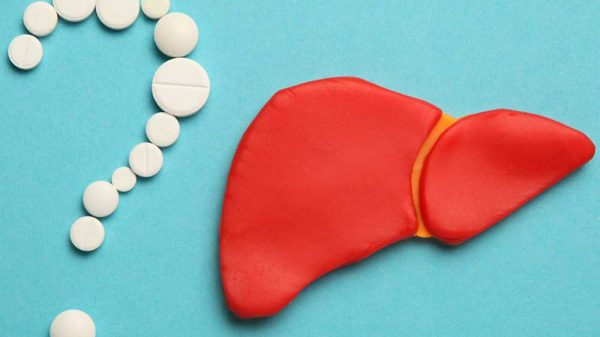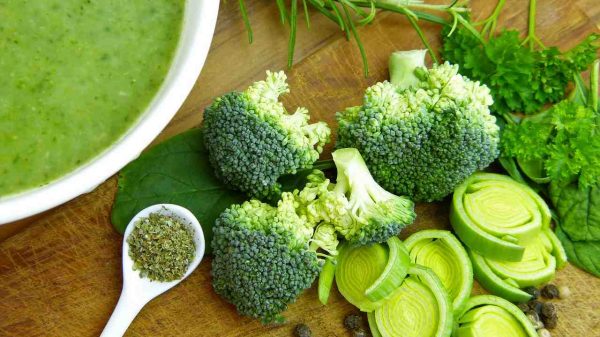Protein, protein, protein. You may have heard about the importance of getting enough protein to support ideal health and fitness. But what exactly is protein? Does protein give you energy? How does protein give you energy? How does protein support the metabolism and the liver? Get the answers to your questions here.
What Is Protein?
Protein is one of the key macronutrients that humans need in their diet. The other key macronutrients are carbohydrates and fats. While getting enough grams of protein is important, what’s even more important is getting enough amino acids. Amino acids are the building blocks of protein that biochemically interact to create whole protein particles.
In general, there are two main types of amino acids: essential amino acids and nonessential amino acids. Nonessential amino acids can be produced by the body and are therefore not necessary to obtain from dietary sources daily. In contrast, optimal ratios of essential amino acids are vital for the synthesis of muscle tissue, connective tissue, neurotransmitters, hormones, and enzymes.
Protein and Energy: Your Questions Answered
Protein is a source of energy because it supplies calories. One gram of protein offers approximately 4 calories. Beyond the calories the protein supplies, it also supplies amino acids. As described above, essential amino acids are absolutely crucial for a vast array of mechanisms, from muscle synthesis to enzyme production. When you’re getting all the raw materials the body needs to carry out all physiological processes, your body can function optimally and supply you with lasting energy. Without amino acids, your body is deprived of the nutrients it needs to carry out biological functions, causing you to experience sluggishness and brain fog.
Moreover, protein is a lasting source of energy. Protein is digested slowly, which serves to slow down the release of sugar into the bloodstream. In turn, this steadies blood sugar levels and supports a healthy metabolism.
Key Benefits of Protein
In addition to supporting your metabolism, getting enough protein is also linked to other key health benefits.
Supporting a Healthy Liver
Dietary protein and essential amino acids are key to ensuring that the liver can carry out all of its duties effectively. Getting enough protein daily protects the liver and helps regulate liver fat levels. In fact, research published in Nutrition showed that essential amino acid supplementation may decrease triglyceride levels and liver fat levels. (1)
Supporting a Healthy Weight
Getting enough protein in your daily diet can help support a healthy weight. Because protein is digested slowly, it helps you feel fuller for longer. This can increase your sense of satiety, helping to decrease your appetite and facilitate weight loss.
Supporting the Immune System
Protein provides the materials the immune system needs to heal and repair tissue. Getting optimal ratios of essential amino acids is crucial for supporting an efficient immune system, helping you heal from injury and disease more quickly.
Boosting Your Protein Intake
Are you aiming to boost your protein intake? Here are some of the best sources of protein.
1. High-Quality Animal Proteins
High-quality animal proteins are excellent sources of protein and offer optimal ratios of essential amino acids. Lean meats like chicken breast, turkey breast, and lean beef are good protein options because they offer high-quality protein without saturated fat.
Fatty fish is also an excellent source of protein that offers optimal ratios of essential amino acids. Plus, fatty fish offers healthy fats like omega-3 fatty acids, which help reduce systemic inflammation and support metabolic and liver health.
Eggs and low-fat dairy also offer optimal ratios of essential amino acids as well as calcium. Low-fat cheese, egg whites, and nonfat Greek yogurt are great options.
2. A Variety of Plant Proteins
Animal products aren’t the only foods with protein! If you’re striving to follow a high-protein diet, including plenty of plant proteins is a good idea, too. Here are good sources of plant protein:
- Whole grains: Whole grains are a great source of fiber, protein, and complex carbohydrates. Examples of whole grains to include in your diet are brown rice, quinoa, whole-grain bread, whole oats, millet, buckwheat, and whole-grain pasta.
- Nuts and seeds: Nuts and seeds offer lots of fiber, protein, antioxidants, and minerals like magnesium. Nuts and seeds are also rich in omega-3 fatty acids. Reach for nuts and seeds like almonds, walnuts, pecans, cashews, hemp seeds, chia seeds, and flaxseeds.
- Beans: Legumes like black beans, navy beans, and kidney beans are rich in protein, healthy carbs, and fiber.
- Soy products: Soybeans and tofu products like tofu and tempeh are excellent sources of protein.
Keep in mind that if you’re striving to get optimal ratios of essential amino acids from plant proteins alone, it’s crucial to consume various plant proteins on a daily basis. No single plant protein source offers all of the essential amino acids that the body needs.
3. Supplementation
Having supplements on hand is important for increasing your protein intake and ensuring that you’re getting optimal ratios of essential amino acids. Supplements are easy to add to water, coffee, or shakes, giving you the extra protein boost you need. Common questions are: Do protein shakes give you energy? Does whey protein give you energy? Does protein powder give you energy? Protein powders like whey protein or casein, essential amino acid supplements, and protein shakes can all increase your energy levels and help the body function optimally.
Essential amino acid supplements are beneficial because they supply the body with individual amino acids that aren’t embedded in the protein particle. This means your body doesn’t need to work as hard to get the benefits of essential amino acids. These supplements are often ideal for individuals with digestive issues, are healing from surgery, have fatty liver disease, or want a low-calorie supplement option.
Things to Keep in Mind
If you’re struggling with incorporating more protein into your diet, check out some of our other articles on increasing protein intake. It’s also a good idea to seek medical advice and guidance from registered dietitians and nutritionists to ensure that your diet fits your specific needs.
Conclusion: Does Protein Give You Energy? The Importance of Protein for Metabolic and Liver Health
Protein offers essential amino acids vital for supporting muscle synthesis, metabolic function, immune health, and liver health. Getting optimal ratios of essential amino acids helps all cells in your body carry out their duties.

References:























